Entrepreneurship and Small Business Management: Post-Brexit UK
VerifiedAdded on 2020/09/03
|15
|4648
|31
Report
AI Summary
This report examines the landscape of entrepreneurship and small business management in the UK, particularly in the context of Brexit. It begins by defining entrepreneurship and its relation to various typologies, including small-business, scale-up, large-scale, and social enterprises. The report delves into the similarities and differences between different entrepreneurial ventures, such as lifestyle, serial, male, and female entrepreneurs. It then analyzes the impact of micro and small businesses on the UK economy, emphasizing their contribution to social economies post-Brexit. The report also identifies key characteristics, traits, and skills of successful entrepreneurs and explores aspects of entrepreneurial personality. Finally, it discusses the backgrounds and experiences that foster entrepreneurship, providing a comprehensive overview of the subject matter.
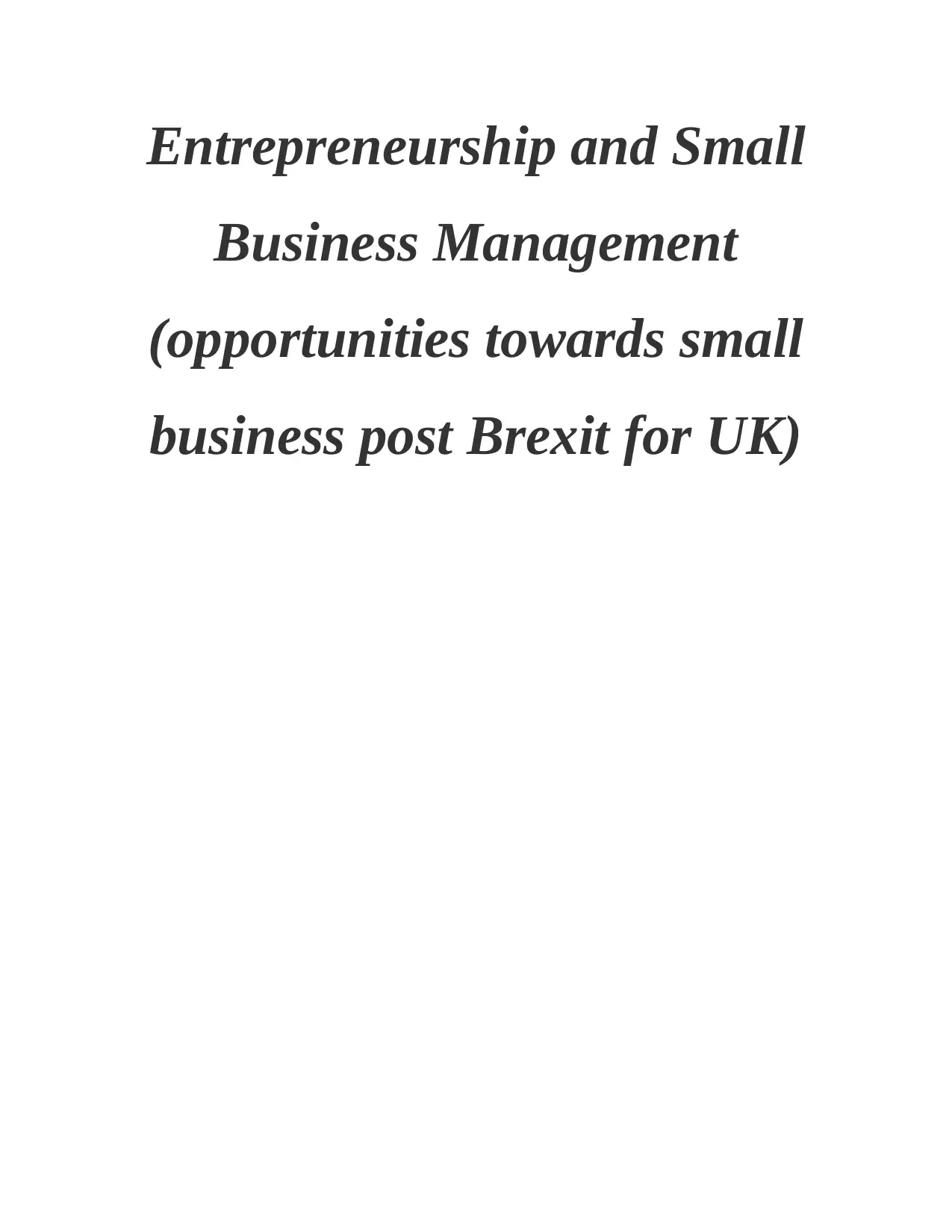
Entrepreneurship and Small
Business Management
(opportunities towards small
business post Brexit for UK)
Business Management
(opportunities towards small
business post Brexit for UK)
Paraphrase This Document
Need a fresh take? Get an instant paraphrase of this document with our AI Paraphraser
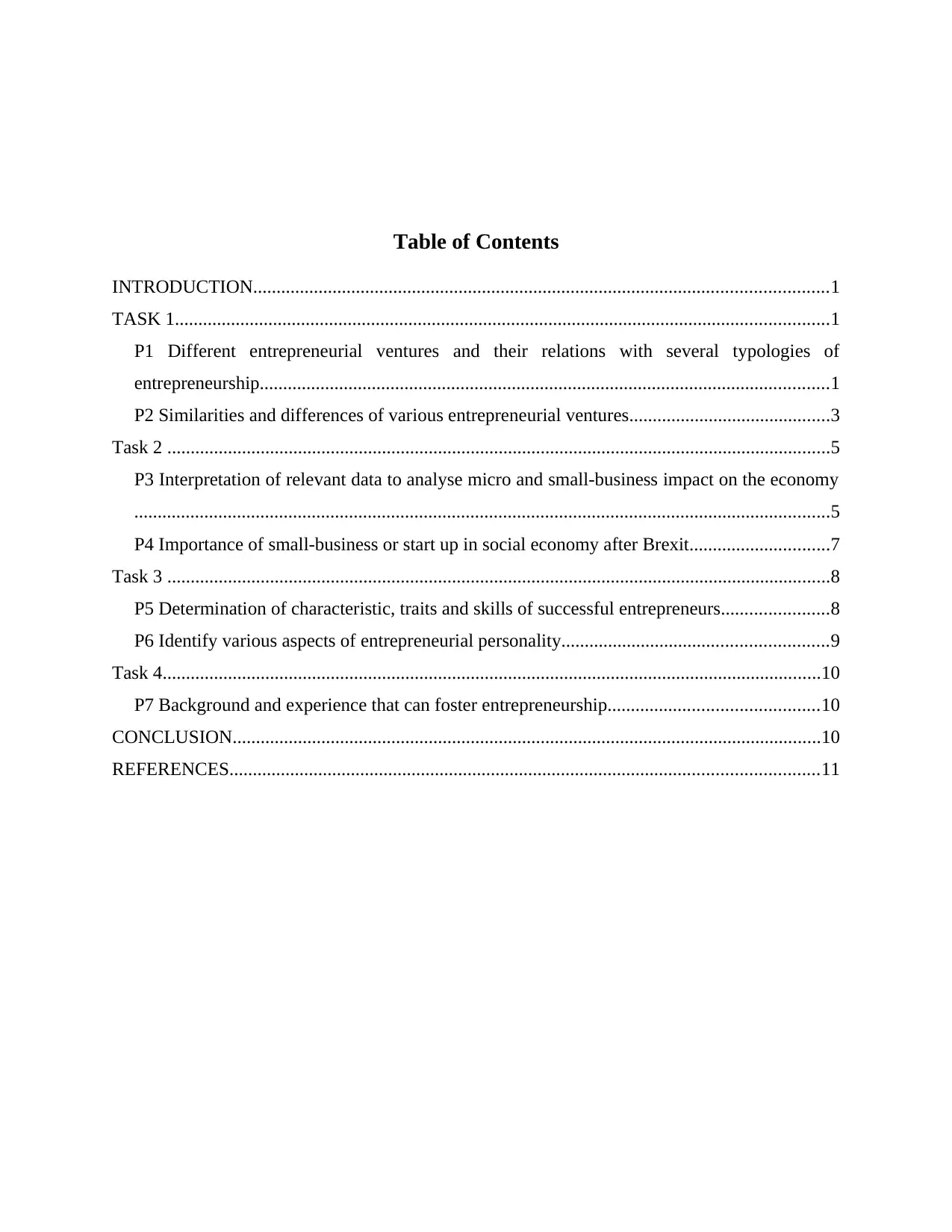
Table of Contents
INTRODUCTION...........................................................................................................................1
TASK 1............................................................................................................................................1
P1 Different entrepreneurial ventures and their relations with several typologies of
entrepreneurship..........................................................................................................................1
P2 Similarities and differences of various entrepreneurial ventures...........................................3
Task 2 ..............................................................................................................................................5
P3 Interpretation of relevant data to analyse micro and small-business impact on the economy
.....................................................................................................................................................5
P4 Importance of small-business or start up in social economy after Brexit..............................7
Task 3 ..............................................................................................................................................8
P5 Determination of characteristic, traits and skills of successful entrepreneurs.......................8
P6 Identify various aspects of entrepreneurial personality.........................................................9
Task 4.............................................................................................................................................10
P7 Background and experience that can foster entrepreneurship.............................................10
CONCLUSION..............................................................................................................................10
REFERENCES..............................................................................................................................11
INTRODUCTION...........................................................................................................................1
TASK 1............................................................................................................................................1
P1 Different entrepreneurial ventures and their relations with several typologies of
entrepreneurship..........................................................................................................................1
P2 Similarities and differences of various entrepreneurial ventures...........................................3
Task 2 ..............................................................................................................................................5
P3 Interpretation of relevant data to analyse micro and small-business impact on the economy
.....................................................................................................................................................5
P4 Importance of small-business or start up in social economy after Brexit..............................7
Task 3 ..............................................................................................................................................8
P5 Determination of characteristic, traits and skills of successful entrepreneurs.......................8
P6 Identify various aspects of entrepreneurial personality.........................................................9
Task 4.............................................................................................................................................10
P7 Background and experience that can foster entrepreneurship.............................................10
CONCLUSION..............................................................................................................................10
REFERENCES..............................................................................................................................11
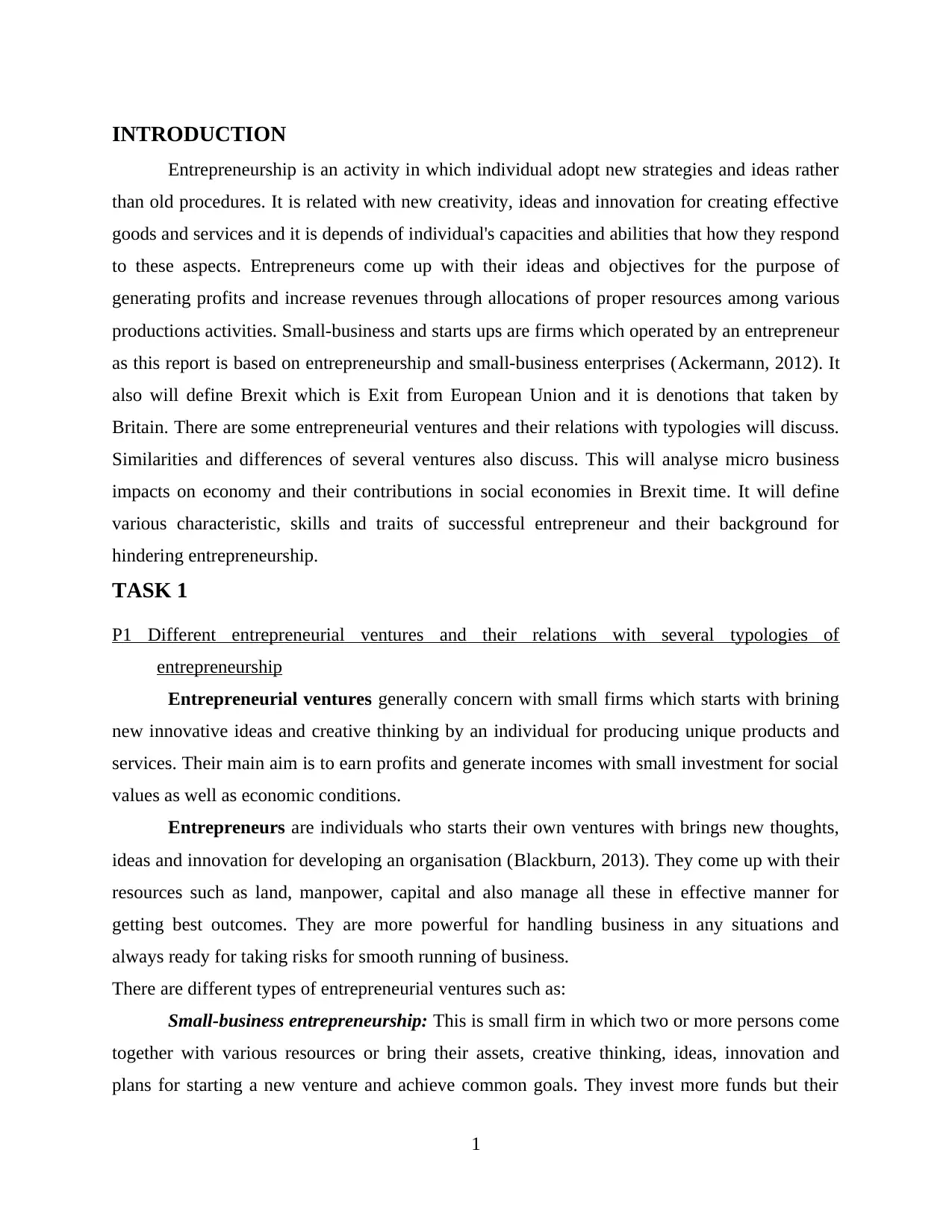
INTRODUCTION
Entrepreneurship is an activity in which individual adopt new strategies and ideas rather
than old procedures. It is related with new creativity, ideas and innovation for creating effective
goods and services and it is depends of individual's capacities and abilities that how they respond
to these aspects. Entrepreneurs come up with their ideas and objectives for the purpose of
generating profits and increase revenues through allocations of proper resources among various
productions activities. Small-business and starts ups are firms which operated by an entrepreneur
as this report is based on entrepreneurship and small-business enterprises (Ackermann, 2012). It
also will define Brexit which is Exit from European Union and it is denotions that taken by
Britain. There are some entrepreneurial ventures and their relations with typologies will discuss.
Similarities and differences of several ventures also discuss. This will analyse micro business
impacts on economy and their contributions in social economies in Brexit time. It will define
various characteristic, skills and traits of successful entrepreneur and their background for
hindering entrepreneurship.
TASK 1
P1 Different entrepreneurial ventures and their relations with several typologies of
entrepreneurship
Entrepreneurial ventures generally concern with small firms which starts with brining
new innovative ideas and creative thinking by an individual for producing unique products and
services. Their main aim is to earn profits and generate incomes with small investment for social
values as well as economic conditions.
Entrepreneurs are individuals who starts their own ventures with brings new thoughts,
ideas and innovation for developing an organisation (Blackburn, 2013). They come up with their
resources such as land, manpower, capital and also manage all these in effective manner for
getting best outcomes. They are more powerful for handling business in any situations and
always ready for taking risks for smooth running of business.
There are different types of entrepreneurial ventures such as:
Small-business entrepreneurship: This is small firm in which two or more persons come
together with various resources or bring their assets, creative thinking, ideas, innovation and
plans for starting a new venture and achieve common goals. They invest more funds but their
1
Entrepreneurship is an activity in which individual adopt new strategies and ideas rather
than old procedures. It is related with new creativity, ideas and innovation for creating effective
goods and services and it is depends of individual's capacities and abilities that how they respond
to these aspects. Entrepreneurs come up with their ideas and objectives for the purpose of
generating profits and increase revenues through allocations of proper resources among various
productions activities. Small-business and starts ups are firms which operated by an entrepreneur
as this report is based on entrepreneurship and small-business enterprises (Ackermann, 2012). It
also will define Brexit which is Exit from European Union and it is denotions that taken by
Britain. There are some entrepreneurial ventures and their relations with typologies will discuss.
Similarities and differences of several ventures also discuss. This will analyse micro business
impacts on economy and their contributions in social economies in Brexit time. It will define
various characteristic, skills and traits of successful entrepreneur and their background for
hindering entrepreneurship.
TASK 1
P1 Different entrepreneurial ventures and their relations with several typologies of
entrepreneurship
Entrepreneurial ventures generally concern with small firms which starts with brining
new innovative ideas and creative thinking by an individual for producing unique products and
services. Their main aim is to earn profits and generate incomes with small investment for social
values as well as economic conditions.
Entrepreneurs are individuals who starts their own ventures with brings new thoughts,
ideas and innovation for developing an organisation (Blackburn, 2013). They come up with their
resources such as land, manpower, capital and also manage all these in effective manner for
getting best outcomes. They are more powerful for handling business in any situations and
always ready for taking risks for smooth running of business.
There are different types of entrepreneurial ventures such as:
Small-business entrepreneurship: This is small firm in which two or more persons come
together with various resources or bring their assets, creative thinking, ideas, innovation and
plans for starting a new venture and achieve common goals. They invest more funds but their
1
⊘ This is a preview!⊘
Do you want full access?
Subscribe today to unlock all pages.

Trusted by 1+ million students worldwide
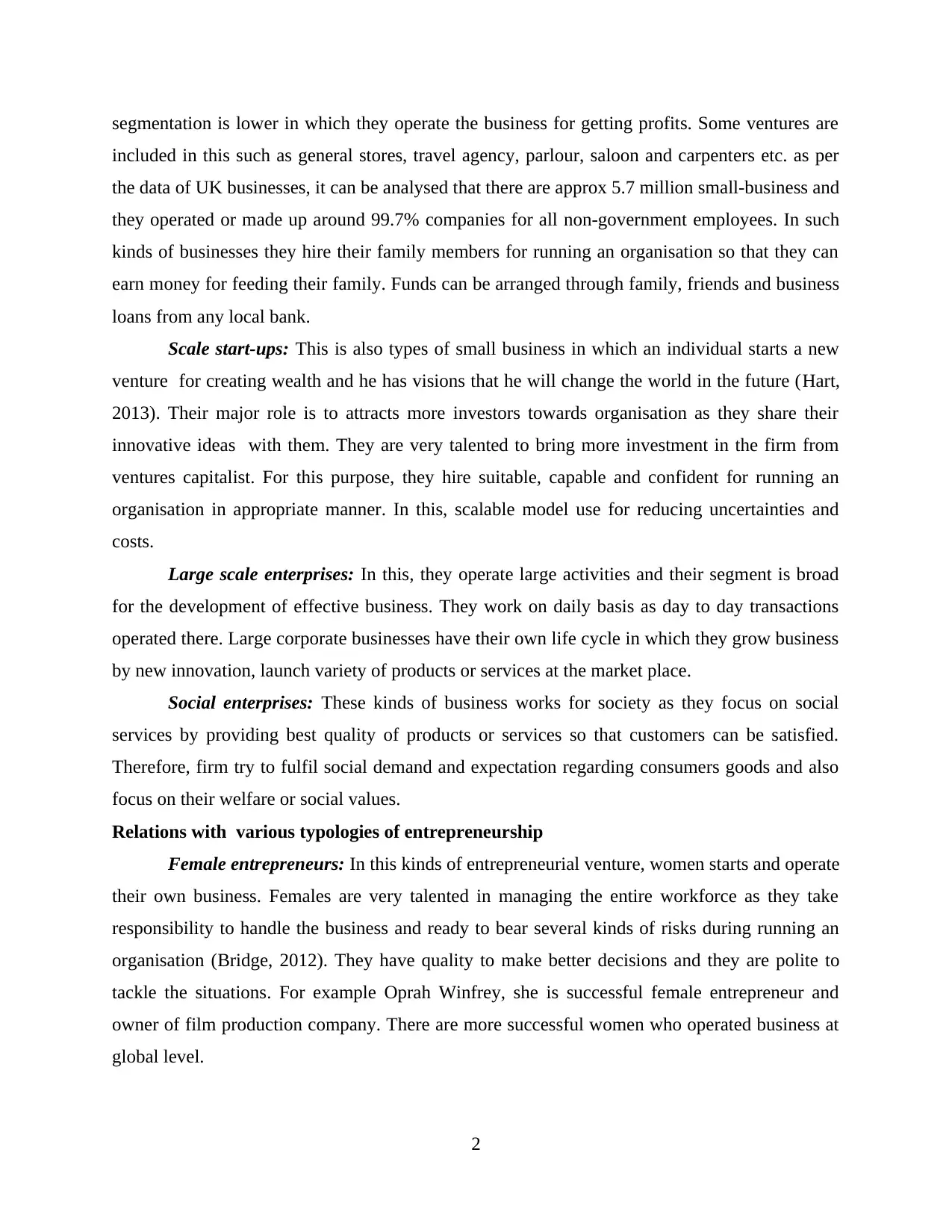
segmentation is lower in which they operate the business for getting profits. Some ventures are
included in this such as general stores, travel agency, parlour, saloon and carpenters etc. as per
the data of UK businesses, it can be analysed that there are approx 5.7 million small-business and
they operated or made up around 99.7% companies for all non-government employees. In such
kinds of businesses they hire their family members for running an organisation so that they can
earn money for feeding their family. Funds can be arranged through family, friends and business
loans from any local bank.
Scale start-ups: This is also types of small business in which an individual starts a new
venture for creating wealth and he has visions that he will change the world in the future (Hart,
2013). Their major role is to attracts more investors towards organisation as they share their
innovative ideas with them. They are very talented to bring more investment in the firm from
ventures capitalist. For this purpose, they hire suitable, capable and confident for running an
organisation in appropriate manner. In this, scalable model use for reducing uncertainties and
costs.
Large scale enterprises: In this, they operate large activities and their segment is broad
for the development of effective business. They work on daily basis as day to day transactions
operated there. Large corporate businesses have their own life cycle in which they grow business
by new innovation, launch variety of products or services at the market place.
Social enterprises: These kinds of business works for society as they focus on social
services by providing best quality of products or services so that customers can be satisfied.
Therefore, firm try to fulfil social demand and expectation regarding consumers goods and also
focus on their welfare or social values.
Relations with various typologies of entrepreneurship
Female entrepreneurs: In this kinds of entrepreneurial venture, women starts and operate
their own business. Females are very talented in managing the entire workforce as they take
responsibility to handle the business and ready to bear several kinds of risks during running an
organisation (Bridge, 2012). They have quality to make better decisions and they are polite to
tackle the situations. For example Oprah Winfrey, she is successful female entrepreneur and
owner of film production company. There are more successful women who operated business at
global level.
2
included in this such as general stores, travel agency, parlour, saloon and carpenters etc. as per
the data of UK businesses, it can be analysed that there are approx 5.7 million small-business and
they operated or made up around 99.7% companies for all non-government employees. In such
kinds of businesses they hire their family members for running an organisation so that they can
earn money for feeding their family. Funds can be arranged through family, friends and business
loans from any local bank.
Scale start-ups: This is also types of small business in which an individual starts a new
venture for creating wealth and he has visions that he will change the world in the future (Hart,
2013). Their major role is to attracts more investors towards organisation as they share their
innovative ideas with them. They are very talented to bring more investment in the firm from
ventures capitalist. For this purpose, they hire suitable, capable and confident for running an
organisation in appropriate manner. In this, scalable model use for reducing uncertainties and
costs.
Large scale enterprises: In this, they operate large activities and their segment is broad
for the development of effective business. They work on daily basis as day to day transactions
operated there. Large corporate businesses have their own life cycle in which they grow business
by new innovation, launch variety of products or services at the market place.
Social enterprises: These kinds of business works for society as they focus on social
services by providing best quality of products or services so that customers can be satisfied.
Therefore, firm try to fulfil social demand and expectation regarding consumers goods and also
focus on their welfare or social values.
Relations with various typologies of entrepreneurship
Female entrepreneurs: In this kinds of entrepreneurial venture, women starts and operate
their own business. Females are very talented in managing the entire workforce as they take
responsibility to handle the business and ready to bear several kinds of risks during running an
organisation (Bridge, 2012). They have quality to make better decisions and they are polite to
tackle the situations. For example Oprah Winfrey, she is successful female entrepreneur and
owner of film production company. There are more successful women who operated business at
global level.
2
Paraphrase This Document
Need a fresh take? Get an instant paraphrase of this document with our AI Paraphraser
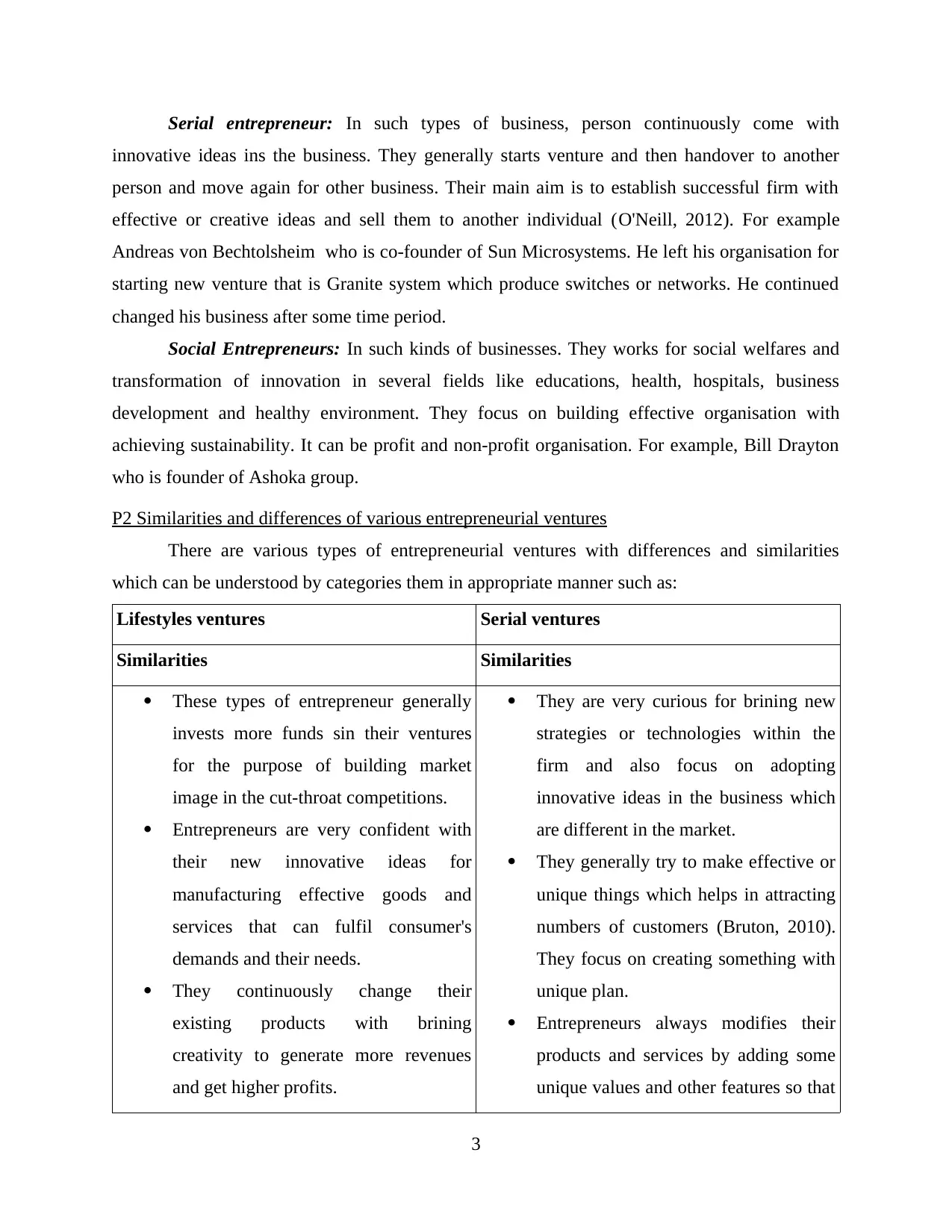
Serial entrepreneur: In such types of business, person continuously come with
innovative ideas ins the business. They generally starts venture and then handover to another
person and move again for other business. Their main aim is to establish successful firm with
effective or creative ideas and sell them to another individual (O'Neill, 2012). For example
Andreas von Bechtolsheim who is co-founder of Sun Microsystems. He left his organisation for
starting new venture that is Granite system which produce switches or networks. He continued
changed his business after some time period.
Social Entrepreneurs: In such kinds of businesses. They works for social welfares and
transformation of innovation in several fields like educations, health, hospitals, business
development and healthy environment. They focus on building effective organisation with
achieving sustainability. It can be profit and non-profit organisation. For example, Bill Drayton
who is founder of Ashoka group.
P2 Similarities and differences of various entrepreneurial ventures
There are various types of entrepreneurial ventures with differences and similarities
which can be understood by categories them in appropriate manner such as:
Lifestyles ventures Serial ventures
Similarities Similarities
These types of entrepreneur generally
invests more funds sin their ventures
for the purpose of building market
image in the cut-throat competitions.
Entrepreneurs are very confident with
their new innovative ideas for
manufacturing effective goods and
services that can fulfil consumer's
demands and their needs.
They continuously change their
existing products with brining
creativity to generate more revenues
and get higher profits.
They are very curious for brining new
strategies or technologies within the
firm and also focus on adopting
innovative ideas in the business which
are different in the market.
They generally try to make effective or
unique things which helps in attracting
numbers of customers (Bruton, 2010).
They focus on creating something with
unique plan.
Entrepreneurs always modifies their
products and services by adding some
unique values and other features so that
3
innovative ideas ins the business. They generally starts venture and then handover to another
person and move again for other business. Their main aim is to establish successful firm with
effective or creative ideas and sell them to another individual (O'Neill, 2012). For example
Andreas von Bechtolsheim who is co-founder of Sun Microsystems. He left his organisation for
starting new venture that is Granite system which produce switches or networks. He continued
changed his business after some time period.
Social Entrepreneurs: In such kinds of businesses. They works for social welfares and
transformation of innovation in several fields like educations, health, hospitals, business
development and healthy environment. They focus on building effective organisation with
achieving sustainability. It can be profit and non-profit organisation. For example, Bill Drayton
who is founder of Ashoka group.
P2 Similarities and differences of various entrepreneurial ventures
There are various types of entrepreneurial ventures with differences and similarities
which can be understood by categories them in appropriate manner such as:
Lifestyles ventures Serial ventures
Similarities Similarities
These types of entrepreneur generally
invests more funds sin their ventures
for the purpose of building market
image in the cut-throat competitions.
Entrepreneurs are very confident with
their new innovative ideas for
manufacturing effective goods and
services that can fulfil consumer's
demands and their needs.
They continuously change their
existing products with brining
creativity to generate more revenues
and get higher profits.
They are very curious for brining new
strategies or technologies within the
firm and also focus on adopting
innovative ideas in the business which
are different in the market.
They generally try to make effective or
unique things which helps in attracting
numbers of customers (Bruton, 2010).
They focus on creating something with
unique plan.
Entrepreneurs always modifies their
products and services by adding some
unique values and other features so that
3
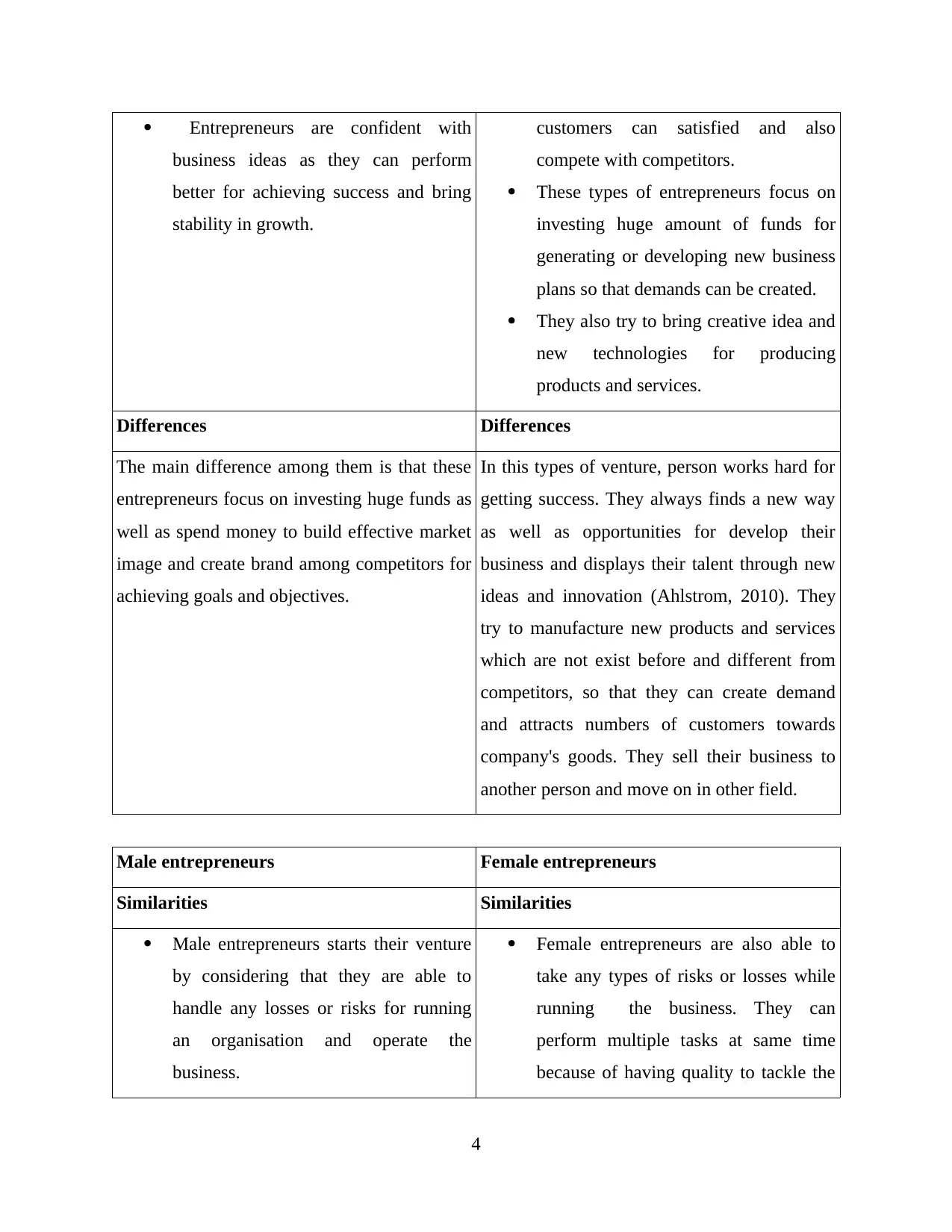
Entrepreneurs are confident with
business ideas as they can perform
better for achieving success and bring
stability in growth.
customers can satisfied and also
compete with competitors.
These types of entrepreneurs focus on
investing huge amount of funds for
generating or developing new business
plans so that demands can be created.
They also try to bring creative idea and
new technologies for producing
products and services.
Differences Differences
The main difference among them is that these
entrepreneurs focus on investing huge funds as
well as spend money to build effective market
image and create brand among competitors for
achieving goals and objectives.
In this types of venture, person works hard for
getting success. They always finds a new way
as well as opportunities for develop their
business and displays their talent through new
ideas and innovation (Ahlstrom, 2010). They
try to manufacture new products and services
which are not exist before and different from
competitors, so that they can create demand
and attracts numbers of customers towards
company's goods. They sell their business to
another person and move on in other field.
Male entrepreneurs Female entrepreneurs
Similarities Similarities
Male entrepreneurs starts their venture
by considering that they are able to
handle any losses or risks for running
an organisation and operate the
business.
Female entrepreneurs are also able to
take any types of risks or losses while
running the business. They can
perform multiple tasks at same time
because of having quality to tackle the
4
business ideas as they can perform
better for achieving success and bring
stability in growth.
customers can satisfied and also
compete with competitors.
These types of entrepreneurs focus on
investing huge amount of funds for
generating or developing new business
plans so that demands can be created.
They also try to bring creative idea and
new technologies for producing
products and services.
Differences Differences
The main difference among them is that these
entrepreneurs focus on investing huge funds as
well as spend money to build effective market
image and create brand among competitors for
achieving goals and objectives.
In this types of venture, person works hard for
getting success. They always finds a new way
as well as opportunities for develop their
business and displays their talent through new
ideas and innovation (Ahlstrom, 2010). They
try to manufacture new products and services
which are not exist before and different from
competitors, so that they can create demand
and attracts numbers of customers towards
company's goods. They sell their business to
another person and move on in other field.
Male entrepreneurs Female entrepreneurs
Similarities Similarities
Male entrepreneurs starts their venture
by considering that they are able to
handle any losses or risks for running
an organisation and operate the
business.
Female entrepreneurs are also able to
take any types of risks or losses while
running the business. They can
perform multiple tasks at same time
because of having quality to tackle the
4
⊘ This is a preview!⊘
Do you want full access?
Subscribe today to unlock all pages.

Trusted by 1+ million students worldwide
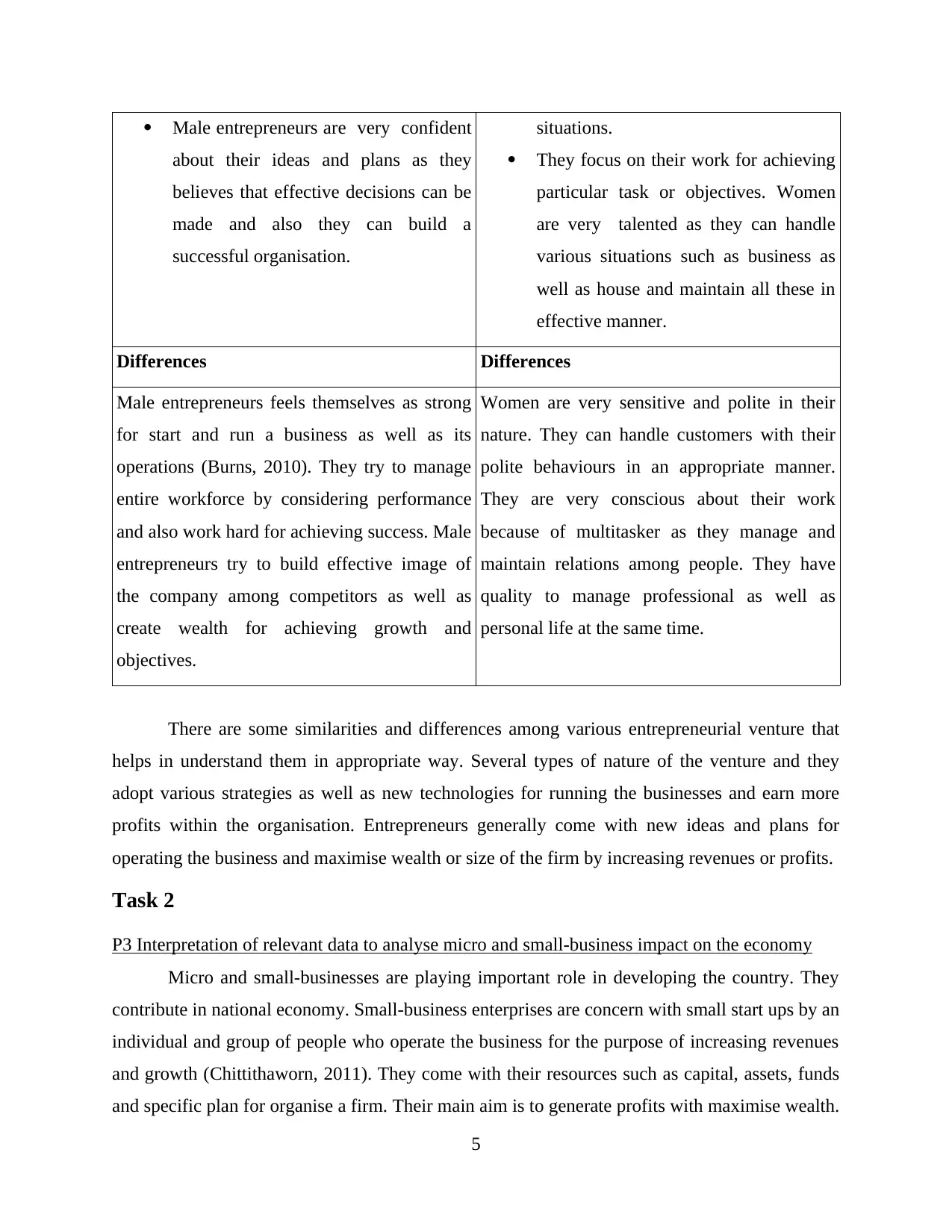
Male entrepreneurs are very confident
about their ideas and plans as they
believes that effective decisions can be
made and also they can build a
successful organisation.
situations.
They focus on their work for achieving
particular task or objectives. Women
are very talented as they can handle
various situations such as business as
well as house and maintain all these in
effective manner.
Differences Differences
Male entrepreneurs feels themselves as strong
for start and run a business as well as its
operations (Burns, 2010). They try to manage
entire workforce by considering performance
and also work hard for achieving success. Male
entrepreneurs try to build effective image of
the company among competitors as well as
create wealth for achieving growth and
objectives.
Women are very sensitive and polite in their
nature. They can handle customers with their
polite behaviours in an appropriate manner.
They are very conscious about their work
because of multitasker as they manage and
maintain relations among people. They have
quality to manage professional as well as
personal life at the same time.
There are some similarities and differences among various entrepreneurial venture that
helps in understand them in appropriate way. Several types of nature of the venture and they
adopt various strategies as well as new technologies for running the businesses and earn more
profits within the organisation. Entrepreneurs generally come with new ideas and plans for
operating the business and maximise wealth or size of the firm by increasing revenues or profits.
Task 2
P3 Interpretation of relevant data to analyse micro and small-business impact on the economy
Micro and small-businesses are playing important role in developing the country. They
contribute in national economy. Small-business enterprises are concern with small start ups by an
individual and group of people who operate the business for the purpose of increasing revenues
and growth (Chittithaworn, 2011). They come with their resources such as capital, assets, funds
and specific plan for organise a firm. Their main aim is to generate profits with maximise wealth.
5
about their ideas and plans as they
believes that effective decisions can be
made and also they can build a
successful organisation.
situations.
They focus on their work for achieving
particular task or objectives. Women
are very talented as they can handle
various situations such as business as
well as house and maintain all these in
effective manner.
Differences Differences
Male entrepreneurs feels themselves as strong
for start and run a business as well as its
operations (Burns, 2010). They try to manage
entire workforce by considering performance
and also work hard for achieving success. Male
entrepreneurs try to build effective image of
the company among competitors as well as
create wealth for achieving growth and
objectives.
Women are very sensitive and polite in their
nature. They can handle customers with their
polite behaviours in an appropriate manner.
They are very conscious about their work
because of multitasker as they manage and
maintain relations among people. They have
quality to manage professional as well as
personal life at the same time.
There are some similarities and differences among various entrepreneurial venture that
helps in understand them in appropriate way. Several types of nature of the venture and they
adopt various strategies as well as new technologies for running the businesses and earn more
profits within the organisation. Entrepreneurs generally come with new ideas and plans for
operating the business and maximise wealth or size of the firm by increasing revenues or profits.
Task 2
P3 Interpretation of relevant data to analyse micro and small-business impact on the economy
Micro and small-businesses are playing important role in developing the country. They
contribute in national economy. Small-business enterprises are concern with small start ups by an
individual and group of people who operate the business for the purpose of increasing revenues
and growth (Chittithaworn, 2011). They come with their resources such as capital, assets, funds
and specific plan for organise a firm. Their main aim is to generate profits with maximise wealth.
5
Paraphrase This Document
Need a fresh take? Get an instant paraphrase of this document with our AI Paraphraser
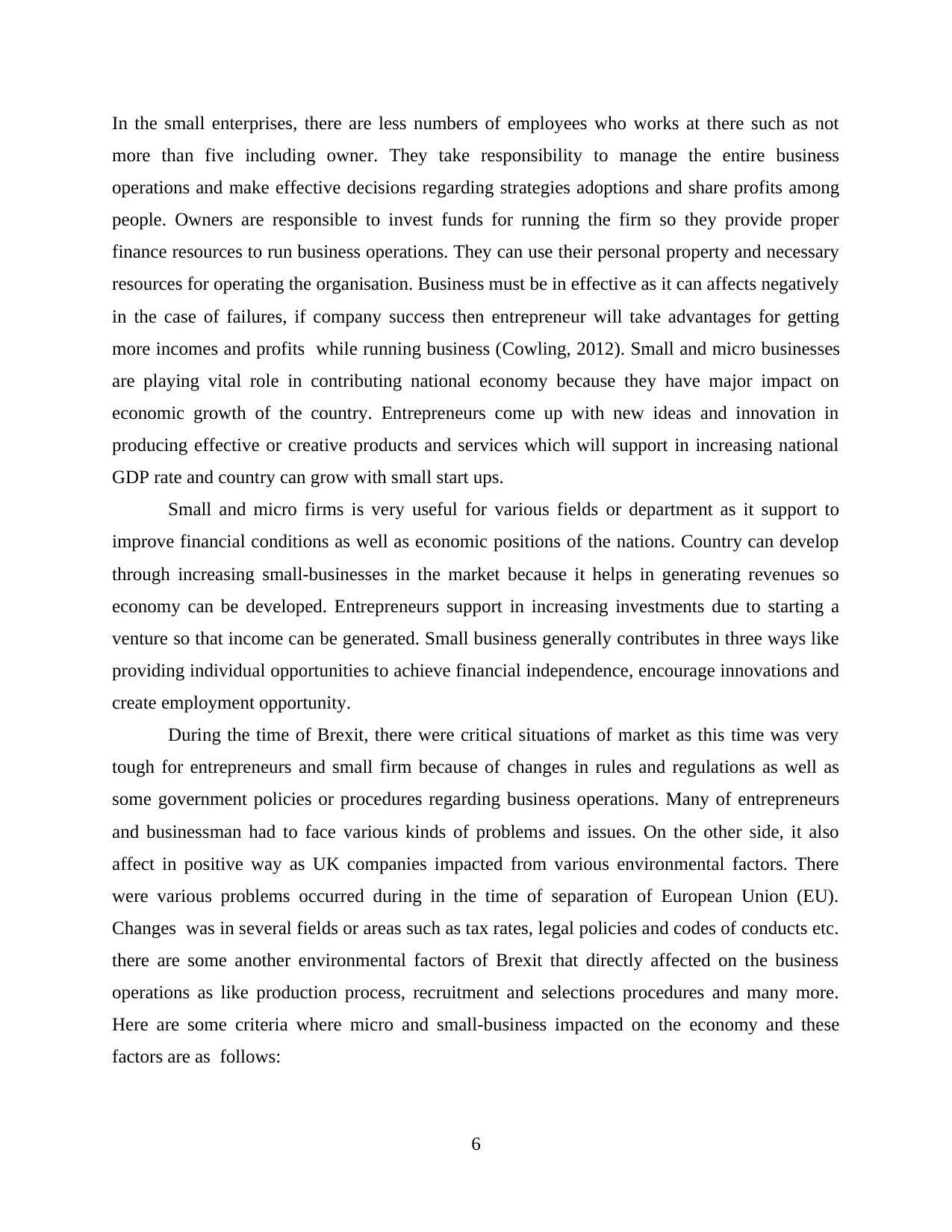
In the small enterprises, there are less numbers of employees who works at there such as not
more than five including owner. They take responsibility to manage the entire business
operations and make effective decisions regarding strategies adoptions and share profits among
people. Owners are responsible to invest funds for running the firm so they provide proper
finance resources to run business operations. They can use their personal property and necessary
resources for operating the organisation. Business must be in effective as it can affects negatively
in the case of failures, if company success then entrepreneur will take advantages for getting
more incomes and profits while running business (Cowling, 2012). Small and micro businesses
are playing vital role in contributing national economy because they have major impact on
economic growth of the country. Entrepreneurs come up with new ideas and innovation in
producing effective or creative products and services which will support in increasing national
GDP rate and country can grow with small start ups.
Small and micro firms is very useful for various fields or department as it support to
improve financial conditions as well as economic positions of the nations. Country can develop
through increasing small-businesses in the market because it helps in generating revenues so
economy can be developed. Entrepreneurs support in increasing investments due to starting a
venture so that income can be generated. Small business generally contributes in three ways like
providing individual opportunities to achieve financial independence, encourage innovations and
create employment opportunity.
During the time of Brexit, there were critical situations of market as this time was very
tough for entrepreneurs and small firm because of changes in rules and regulations as well as
some government policies or procedures regarding business operations. Many of entrepreneurs
and businessman had to face various kinds of problems and issues. On the other side, it also
affect in positive way as UK companies impacted from various environmental factors. There
were various problems occurred during in the time of separation of European Union (EU).
Changes was in several fields or areas such as tax rates, legal policies and codes of conducts etc.
there are some another environmental factors of Brexit that directly affected on the business
operations as like production process, recruitment and selections procedures and many more.
Here are some criteria where micro and small-business impacted on the economy and these
factors are as follows:
6
more than five including owner. They take responsibility to manage the entire business
operations and make effective decisions regarding strategies adoptions and share profits among
people. Owners are responsible to invest funds for running the firm so they provide proper
finance resources to run business operations. They can use their personal property and necessary
resources for operating the organisation. Business must be in effective as it can affects negatively
in the case of failures, if company success then entrepreneur will take advantages for getting
more incomes and profits while running business (Cowling, 2012). Small and micro businesses
are playing vital role in contributing national economy because they have major impact on
economic growth of the country. Entrepreneurs come up with new ideas and innovation in
producing effective or creative products and services which will support in increasing national
GDP rate and country can grow with small start ups.
Small and micro firms is very useful for various fields or department as it support to
improve financial conditions as well as economic positions of the nations. Country can develop
through increasing small-businesses in the market because it helps in generating revenues so
economy can be developed. Entrepreneurs support in increasing investments due to starting a
venture so that income can be generated. Small business generally contributes in three ways like
providing individual opportunities to achieve financial independence, encourage innovations and
create employment opportunity.
During the time of Brexit, there were critical situations of market as this time was very
tough for entrepreneurs and small firm because of changes in rules and regulations as well as
some government policies or procedures regarding business operations. Many of entrepreneurs
and businessman had to face various kinds of problems and issues. On the other side, it also
affect in positive way as UK companies impacted from various environmental factors. There
were various problems occurred during in the time of separation of European Union (EU).
Changes was in several fields or areas such as tax rates, legal policies and codes of conducts etc.
there are some another environmental factors of Brexit that directly affected on the business
operations as like production process, recruitment and selections procedures and many more.
Here are some criteria where micro and small-business impacted on the economy and these
factors are as follows:
6
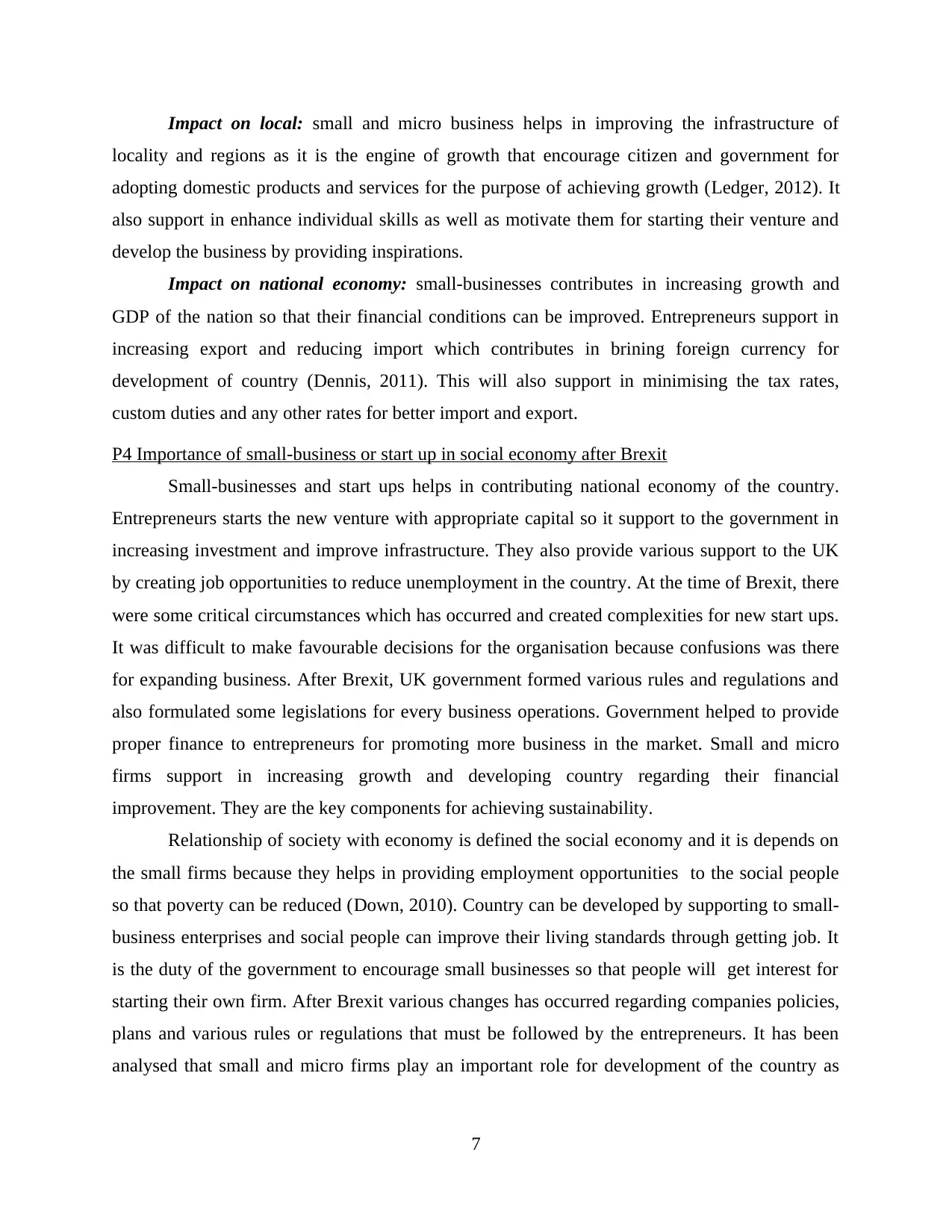
Impact on local: small and micro business helps in improving the infrastructure of
locality and regions as it is the engine of growth that encourage citizen and government for
adopting domestic products and services for the purpose of achieving growth (Ledger, 2012). It
also support in enhance individual skills as well as motivate them for starting their venture and
develop the business by providing inspirations.
Impact on national economy: small-businesses contributes in increasing growth and
GDP of the nation so that their financial conditions can be improved. Entrepreneurs support in
increasing export and reducing import which contributes in brining foreign currency for
development of country (Dennis, 2011). This will also support in minimising the tax rates,
custom duties and any other rates for better import and export.
P4 Importance of small-business or start up in social economy after Brexit
Small-businesses and start ups helps in contributing national economy of the country.
Entrepreneurs starts the new venture with appropriate capital so it support to the government in
increasing investment and improve infrastructure. They also provide various support to the UK
by creating job opportunities to reduce unemployment in the country. At the time of Brexit, there
were some critical circumstances which has occurred and created complexities for new start ups.
It was difficult to make favourable decisions for the organisation because confusions was there
for expanding business. After Brexit, UK government formed various rules and regulations and
also formulated some legislations for every business operations. Government helped to provide
proper finance to entrepreneurs for promoting more business in the market. Small and micro
firms support in increasing growth and developing country regarding their financial
improvement. They are the key components for achieving sustainability.
Relationship of society with economy is defined the social economy and it is depends on
the small firms because they helps in providing employment opportunities to the social people
so that poverty can be reduced (Down, 2010). Country can be developed by supporting to small-
business enterprises and social people can improve their living standards through getting job. It
is the duty of the government to encourage small businesses so that people will get interest for
starting their own firm. After Brexit various changes has occurred regarding companies policies,
plans and various rules or regulations that must be followed by the entrepreneurs. It has been
analysed that small and micro firms play an important role for development of the country as
7
locality and regions as it is the engine of growth that encourage citizen and government for
adopting domestic products and services for the purpose of achieving growth (Ledger, 2012). It
also support in enhance individual skills as well as motivate them for starting their venture and
develop the business by providing inspirations.
Impact on national economy: small-businesses contributes in increasing growth and
GDP of the nation so that their financial conditions can be improved. Entrepreneurs support in
increasing export and reducing import which contributes in brining foreign currency for
development of country (Dennis, 2011). This will also support in minimising the tax rates,
custom duties and any other rates for better import and export.
P4 Importance of small-business or start up in social economy after Brexit
Small-businesses and start ups helps in contributing national economy of the country.
Entrepreneurs starts the new venture with appropriate capital so it support to the government in
increasing investment and improve infrastructure. They also provide various support to the UK
by creating job opportunities to reduce unemployment in the country. At the time of Brexit, there
were some critical circumstances which has occurred and created complexities for new start ups.
It was difficult to make favourable decisions for the organisation because confusions was there
for expanding business. After Brexit, UK government formed various rules and regulations and
also formulated some legislations for every business operations. Government helped to provide
proper finance to entrepreneurs for promoting more business in the market. Small and micro
firms support in increasing growth and developing country regarding their financial
improvement. They are the key components for achieving sustainability.
Relationship of society with economy is defined the social economy and it is depends on
the small firms because they helps in providing employment opportunities to the social people
so that poverty can be reduced (Down, 2010). Country can be developed by supporting to small-
business enterprises and social people can improve their living standards through getting job. It
is the duty of the government to encourage small businesses so that people will get interest for
starting their own firm. After Brexit various changes has occurred regarding companies policies,
plans and various rules or regulations that must be followed by the entrepreneurs. It has been
analysed that small and micro firms play an important role for development of the country as
7
⊘ This is a preview!⊘
Do you want full access?
Subscribe today to unlock all pages.

Trusted by 1+ million students worldwide
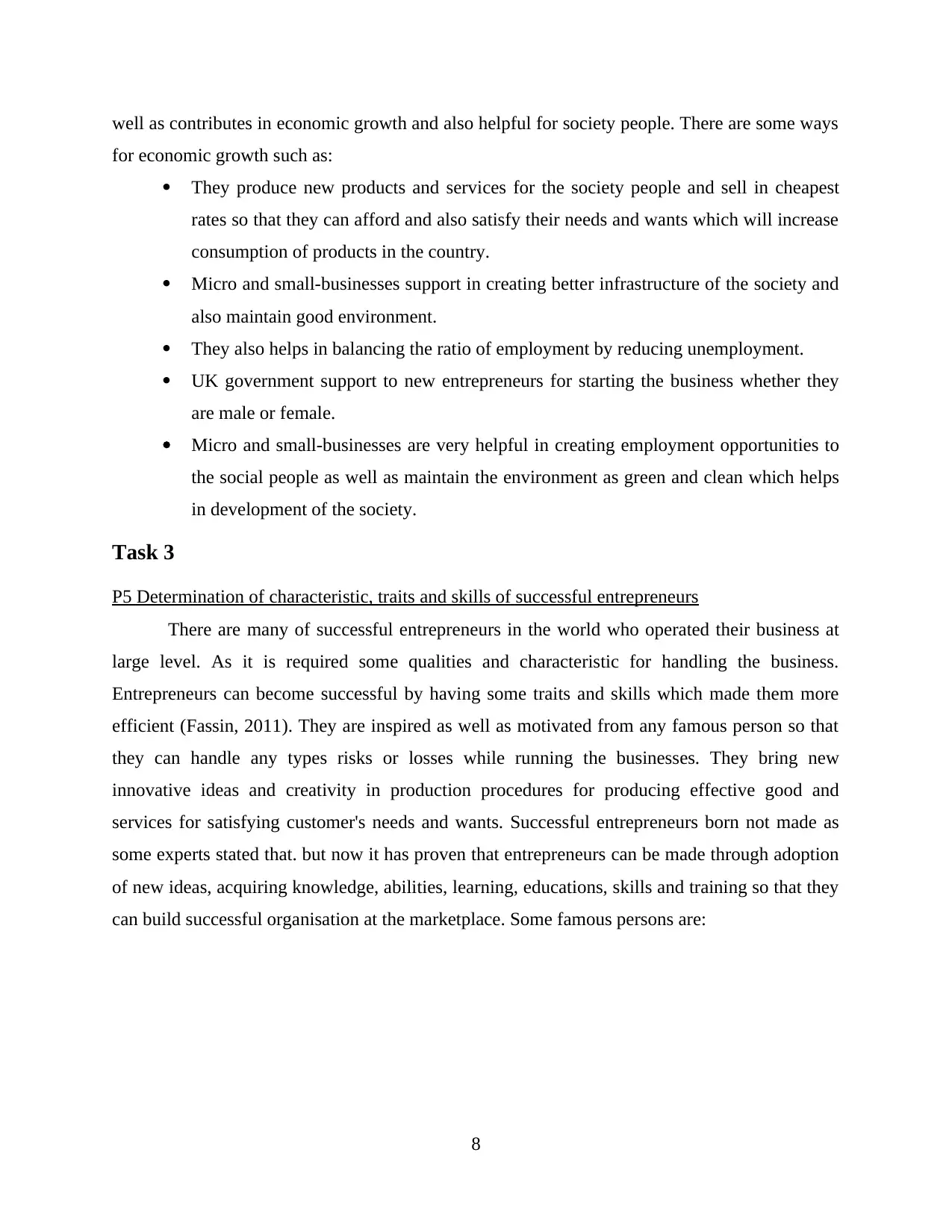
well as contributes in economic growth and also helpful for society people. There are some ways
for economic growth such as:
They produce new products and services for the society people and sell in cheapest
rates so that they can afford and also satisfy their needs and wants which will increase
consumption of products in the country.
Micro and small-businesses support in creating better infrastructure of the society and
also maintain good environment.
They also helps in balancing the ratio of employment by reducing unemployment.
UK government support to new entrepreneurs for starting the business whether they
are male or female.
Micro and small-businesses are very helpful in creating employment opportunities to
the social people as well as maintain the environment as green and clean which helps
in development of the society.
Task 3
P5 Determination of characteristic, traits and skills of successful entrepreneurs
There are many of successful entrepreneurs in the world who operated their business at
large level. As it is required some qualities and characteristic for handling the business.
Entrepreneurs can become successful by having some traits and skills which made them more
efficient (Fassin, 2011). They are inspired as well as motivated from any famous person so that
they can handle any types risks or losses while running the businesses. They bring new
innovative ideas and creativity in production procedures for producing effective good and
services for satisfying customer's needs and wants. Successful entrepreneurs born not made as
some experts stated that. but now it has proven that entrepreneurs can be made through adoption
of new ideas, acquiring knowledge, abilities, learning, educations, skills and training so that they
can build successful organisation at the marketplace. Some famous persons are:
8
for economic growth such as:
They produce new products and services for the society people and sell in cheapest
rates so that they can afford and also satisfy their needs and wants which will increase
consumption of products in the country.
Micro and small-businesses support in creating better infrastructure of the society and
also maintain good environment.
They also helps in balancing the ratio of employment by reducing unemployment.
UK government support to new entrepreneurs for starting the business whether they
are male or female.
Micro and small-businesses are very helpful in creating employment opportunities to
the social people as well as maintain the environment as green and clean which helps
in development of the society.
Task 3
P5 Determination of characteristic, traits and skills of successful entrepreneurs
There are many of successful entrepreneurs in the world who operated their business at
large level. As it is required some qualities and characteristic for handling the business.
Entrepreneurs can become successful by having some traits and skills which made them more
efficient (Fassin, 2011). They are inspired as well as motivated from any famous person so that
they can handle any types risks or losses while running the businesses. They bring new
innovative ideas and creativity in production procedures for producing effective good and
services for satisfying customer's needs and wants. Successful entrepreneurs born not made as
some experts stated that. but now it has proven that entrepreneurs can be made through adoption
of new ideas, acquiring knowledge, abilities, learning, educations, skills and training so that they
can build successful organisation at the marketplace. Some famous persons are:
8
Paraphrase This Document
Need a fresh take? Get an instant paraphrase of this document with our AI Paraphraser
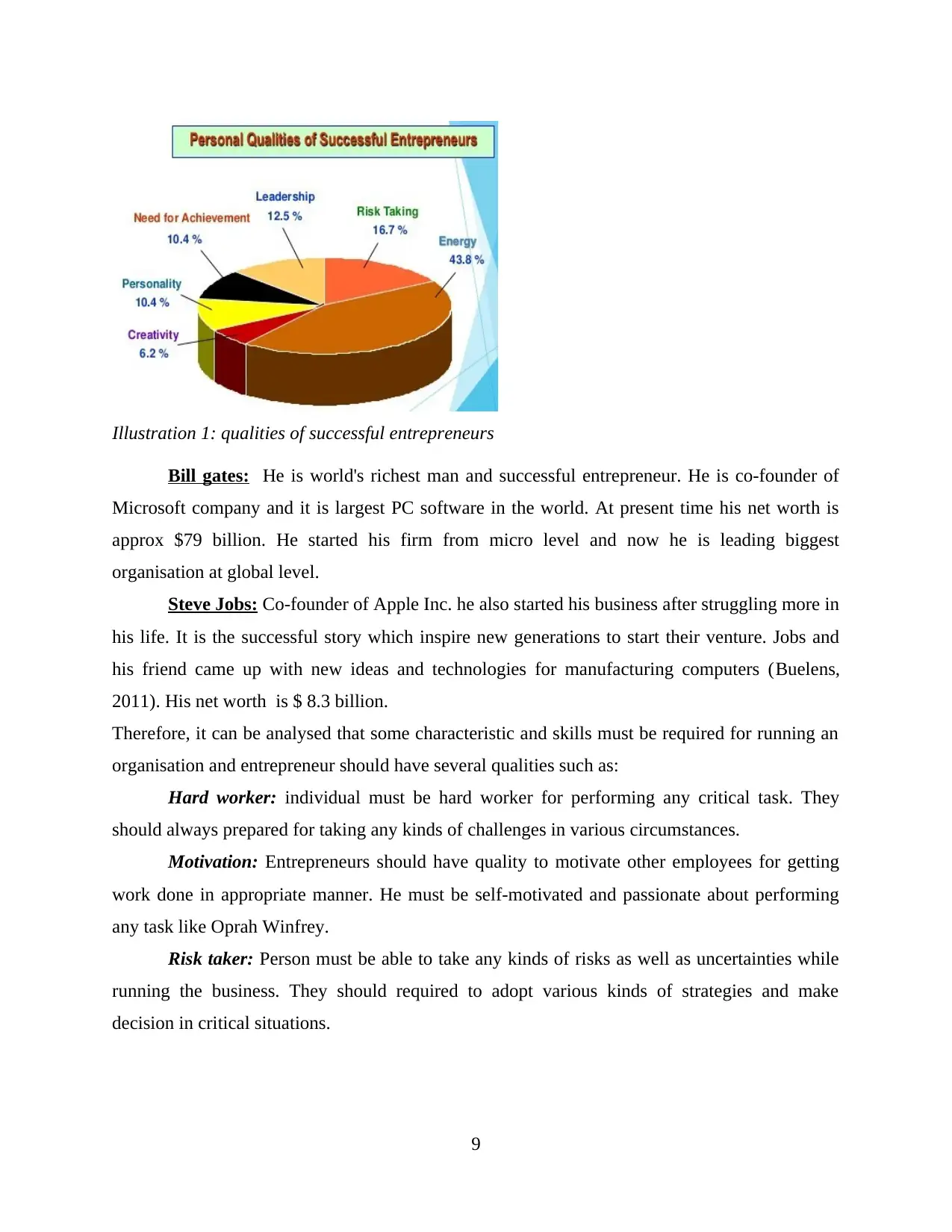
Illustration 1: qualities of successful entrepreneurs
Bill gates: He is world's richest man and successful entrepreneur. He is co-founder of
Microsoft company and it is largest PC software in the world. At present time his net worth is
approx $79 billion. He started his firm from micro level and now he is leading biggest
organisation at global level.
Steve Jobs: Co-founder of Apple Inc. he also started his business after struggling more in
his life. It is the successful story which inspire new generations to start their venture. Jobs and
his friend came up with new ideas and technologies for manufacturing computers (Buelens,
2011). His net worth is $ 8.3 billion.
Therefore, it can be analysed that some characteristic and skills must be required for running an
organisation and entrepreneur should have several qualities such as:
Hard worker: individual must be hard worker for performing any critical task. They
should always prepared for taking any kinds of challenges in various circumstances.
Motivation: Entrepreneurs should have quality to motivate other employees for getting
work done in appropriate manner. He must be self-motivated and passionate about performing
any task like Oprah Winfrey.
Risk taker: Person must be able to take any kinds of risks as well as uncertainties while
running the business. They should required to adopt various kinds of strategies and make
decision in critical situations.
9
Bill gates: He is world's richest man and successful entrepreneur. He is co-founder of
Microsoft company and it is largest PC software in the world. At present time his net worth is
approx $79 billion. He started his firm from micro level and now he is leading biggest
organisation at global level.
Steve Jobs: Co-founder of Apple Inc. he also started his business after struggling more in
his life. It is the successful story which inspire new generations to start their venture. Jobs and
his friend came up with new ideas and technologies for manufacturing computers (Buelens,
2011). His net worth is $ 8.3 billion.
Therefore, it can be analysed that some characteristic and skills must be required for running an
organisation and entrepreneur should have several qualities such as:
Hard worker: individual must be hard worker for performing any critical task. They
should always prepared for taking any kinds of challenges in various circumstances.
Motivation: Entrepreneurs should have quality to motivate other employees for getting
work done in appropriate manner. He must be self-motivated and passionate about performing
any task like Oprah Winfrey.
Risk taker: Person must be able to take any kinds of risks as well as uncertainties while
running the business. They should required to adopt various kinds of strategies and make
decision in critical situations.
9
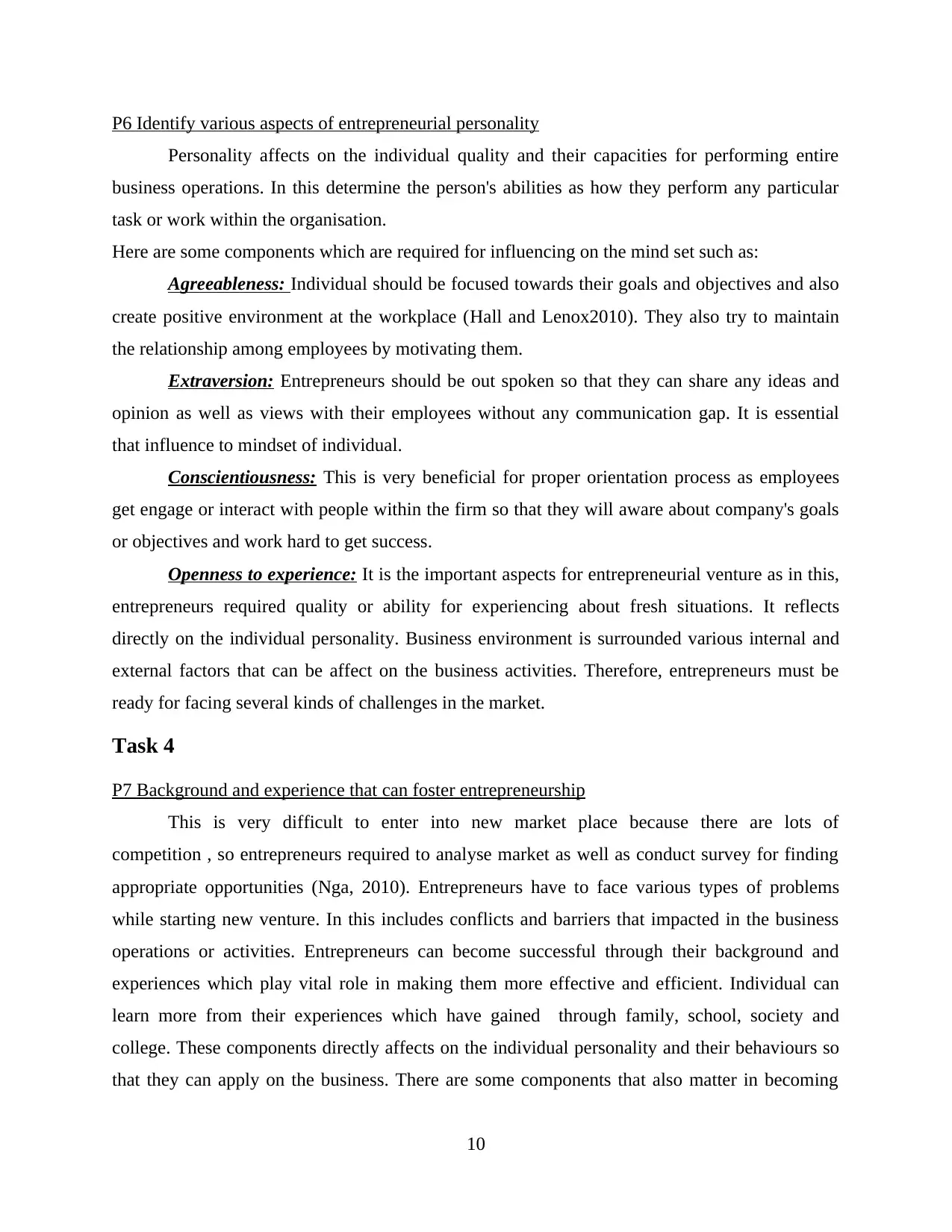
P6 Identify various aspects of entrepreneurial personality
Personality affects on the individual quality and their capacities for performing entire
business operations. In this determine the person's abilities as how they perform any particular
task or work within the organisation.
Here are some components which are required for influencing on the mind set such as:
Agreeableness: Individual should be focused towards their goals and objectives and also
create positive environment at the workplace (Hall and Lenox2010). They also try to maintain
the relationship among employees by motivating them.
Extraversion: Entrepreneurs should be out spoken so that they can share any ideas and
opinion as well as views with their employees without any communication gap. It is essential
that influence to mindset of individual.
Conscientiousness: This is very beneficial for proper orientation process as employees
get engage or interact with people within the firm so that they will aware about company's goals
or objectives and work hard to get success.
Openness to experience: It is the important aspects for entrepreneurial venture as in this,
entrepreneurs required quality or ability for experiencing about fresh situations. It reflects
directly on the individual personality. Business environment is surrounded various internal and
external factors that can be affect on the business activities. Therefore, entrepreneurs must be
ready for facing several kinds of challenges in the market.
Task 4
P7 Background and experience that can foster entrepreneurship
This is very difficult to enter into new market place because there are lots of
competition , so entrepreneurs required to analyse market as well as conduct survey for finding
appropriate opportunities (Nga, 2010). Entrepreneurs have to face various types of problems
while starting new venture. In this includes conflicts and barriers that impacted in the business
operations or activities. Entrepreneurs can become successful through their background and
experiences which play vital role in making them more effective and efficient. Individual can
learn more from their experiences which have gained through family, school, society and
college. These components directly affects on the individual personality and their behaviours so
that they can apply on the business. There are some components that also matter in becoming
10
Personality affects on the individual quality and their capacities for performing entire
business operations. In this determine the person's abilities as how they perform any particular
task or work within the organisation.
Here are some components which are required for influencing on the mind set such as:
Agreeableness: Individual should be focused towards their goals and objectives and also
create positive environment at the workplace (Hall and Lenox2010). They also try to maintain
the relationship among employees by motivating them.
Extraversion: Entrepreneurs should be out spoken so that they can share any ideas and
opinion as well as views with their employees without any communication gap. It is essential
that influence to mindset of individual.
Conscientiousness: This is very beneficial for proper orientation process as employees
get engage or interact with people within the firm so that they will aware about company's goals
or objectives and work hard to get success.
Openness to experience: It is the important aspects for entrepreneurial venture as in this,
entrepreneurs required quality or ability for experiencing about fresh situations. It reflects
directly on the individual personality. Business environment is surrounded various internal and
external factors that can be affect on the business activities. Therefore, entrepreneurs must be
ready for facing several kinds of challenges in the market.
Task 4
P7 Background and experience that can foster entrepreneurship
This is very difficult to enter into new market place because there are lots of
competition , so entrepreneurs required to analyse market as well as conduct survey for finding
appropriate opportunities (Nga, 2010). Entrepreneurs have to face various types of problems
while starting new venture. In this includes conflicts and barriers that impacted in the business
operations or activities. Entrepreneurs can become successful through their background and
experiences which play vital role in making them more effective and efficient. Individual can
learn more from their experiences which have gained through family, school, society and
college. These components directly affects on the individual personality and their behaviours so
that they can apply on the business. There are some components that also matter in becoming
10
⊘ This is a preview!⊘
Do you want full access?
Subscribe today to unlock all pages.

Trusted by 1+ million students worldwide
1 out of 15
Related Documents
Your All-in-One AI-Powered Toolkit for Academic Success.
+13062052269
info@desklib.com
Available 24*7 on WhatsApp / Email
![[object Object]](/_next/static/media/star-bottom.7253800d.svg)
Unlock your academic potential
Copyright © 2020–2026 A2Z Services. All Rights Reserved. Developed and managed by ZUCOL.





